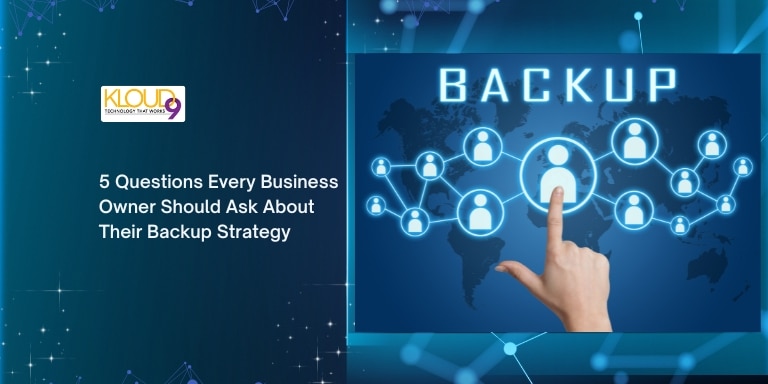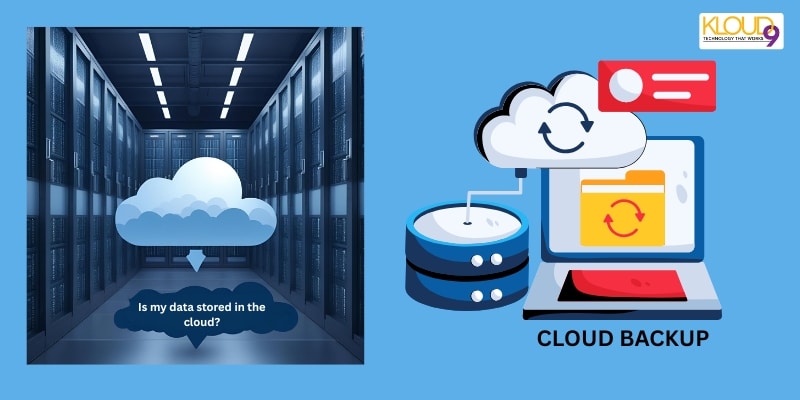It is worth prioritizing business data protection, as losing vital information can ruin operations. Without a solid backup strategy, a damaged reputation, financial losses, and a permanent shutdown of your business can result.
Having a solid backup plan and a cybersecurity solution like cloud computing can reduce the risk of data loss. Plus, you are more at peace when you know that your data is secure and that you can quickly have it restored in case of an unexpected occurrence.
While you can access IT support services, ignoring the importance of regularly revisiting and updating your backup plans can increase the risk of downtime and data loss.
So, it is necessary to ask the right questions when trying to assess your data backup strategy, and here are five outstanding ones you should never overlook.
Questions to Ask About Your Business Backup Plan
To ensure the effectiveness of your business backup plan, consider asking the following questions:
1. What Kind of Data is Included in Your Backup?
Your backup system should capture your entire IT infrastructure, including all endpoints, servers, and computers, not just distinct types of files. This extensive strategy ensures that systems and vital data can be restored in the event of data loss, reducing potential losses and downtime.
You can look for a backup solution that can help you manage full-system backups and application data, as well as store relevant files to provide complete protection for your business records. You can ask questions such as
- Will my backup system capture only a few file types or an entire infrastructure?
- Are all my systems and endpoints included in the backup, or just the servers?
Suppose you rely solely on Google Drive or a similar cloud computing solution as your business's backup system. In that case, you might be vulnerable if your network falls victim to ransomware, as it might fail to provide access to critical applications and systems.
Having files backed up in the cloud might not be enough if your systems are compromised. You may still face the daunting task of manually reinstalling operating systems or even hiring managed security services. You must be able to restore your data rapidly during a disaster to minimize downtime and prevent business closure.
2. How Often Can Backups Be Performed?
It is also essential to ask questions about your backup frequency. For example, can your backup be automated to run at a desired pace, including hourly, daily, or weekly? How often can these backups be performed? Can backups be adjusted to suit business needs?
Modern businesses constantly generate more data, including customer records, emails, creative assets, and inventory. Without cloud computing solutions or regular backups, potential data loss in a disaster can be destructive. So, an authentic backup plan is critical to lower the effect of data loss and ensure the business continues to thrive.
However, the frequency of backups depends on your Recovery Point Objectives (RPO) and business needs outlined in your continuity plan. Go with a backup solution that meets your required frequency to ensure minimal data loss in case of a disaster.
3. Where Are the Backups Stored?
When it comes to backup storage locations, the following questions matter:
- Is my data stored in the cloud?
- How fast can I restore my data?
- How much control do I have over data handling and management in the backup system?
- If my cloud backups are compromised or lost, do I have a redundant copy stored elsewhere that I can access?
Whether you choose local storage, private cloud, remote storage, or a combination of cloud and on-site storage, the location you choose can influence data security, accessibility, and recovery time. For example, if backups are stored on-site and a disaster like a fire destroys the local infrastructure, the backups could be lost, too. However, having cloud or off-site storage can provide an extra layer of protection against such risks.
Combining a hybrid cloud backup setup with on-site appliances guarantees quick access and cloud replication for added security, as it offers solid data protection solutions and speed.
Hybrid cloud is typically better for backups, and it's an excellent cloud computing solution because it integrates the speed and convenience of local backups when data loss occurs, backing up systems and protecting cloud replication. This ensures that data remains safe and accessible in the cloud even after local infrastructure is compromised, providing a reliable failsafe.
4. Are the Backups Tested, and How?
Backup testing is vital in continuity planning, as it guarantees that backups work as they should and can be restored as needed. When evaluating business continuity or disaster recovery, the aim is to prepare ahead of disasters or disruptions, minimize downtime, and recover data and systems efficiently. So, to keep your business operations running smoothly, confirm the testing process, as it can vary between solutions, to ensure it meets your requirements.
Systems with automatic backup and disaster recovery services offer additional assurance. Typically, each current backup must undergo automatic testing to verify its recoverability and viability. This reduces the need for manual checks and frees up the need for managed security services.
5. What Other Recovery Options Are Available?
Various recovery options are often available, including volume restore, file-level restore, disk-level restore, and virtualization. These options ensure efficient and flexible data recovery, helping to reduce downtime and facilitate business continuity in various disaster scenarios.
However, different disasters often require different recovery approaches. For instance, if a file like a spreadsheet is accidentally deleted, an easy file-level recovery is sufficient, eliminating the need for virtualization or a complete backup restoration. In contrast, a server infected with ransomware may require a more extensive recovery approach, like a bare metal restore, to reboot it.
Other small business backup solutions that can offer multiple recovery options include
- Local, off-site, and hybrid virtualization
- Backup image export (VMDK, VHD, VHDX)
- ESX upload
- Bare metal restore
Conclusion
Having a robust backup strategy is critical for data protection and business continuity. But it starts with asking the right questions. As a business owner, you can ensure your backup solutions are efficient, reliable, and tailored to your specific needs through intensive backup and disaster recovery services, ensuring that your data is safely stored and minimizing downtime in the face of unexpected disturbances in your business network.





You must be logged in to post a comment.